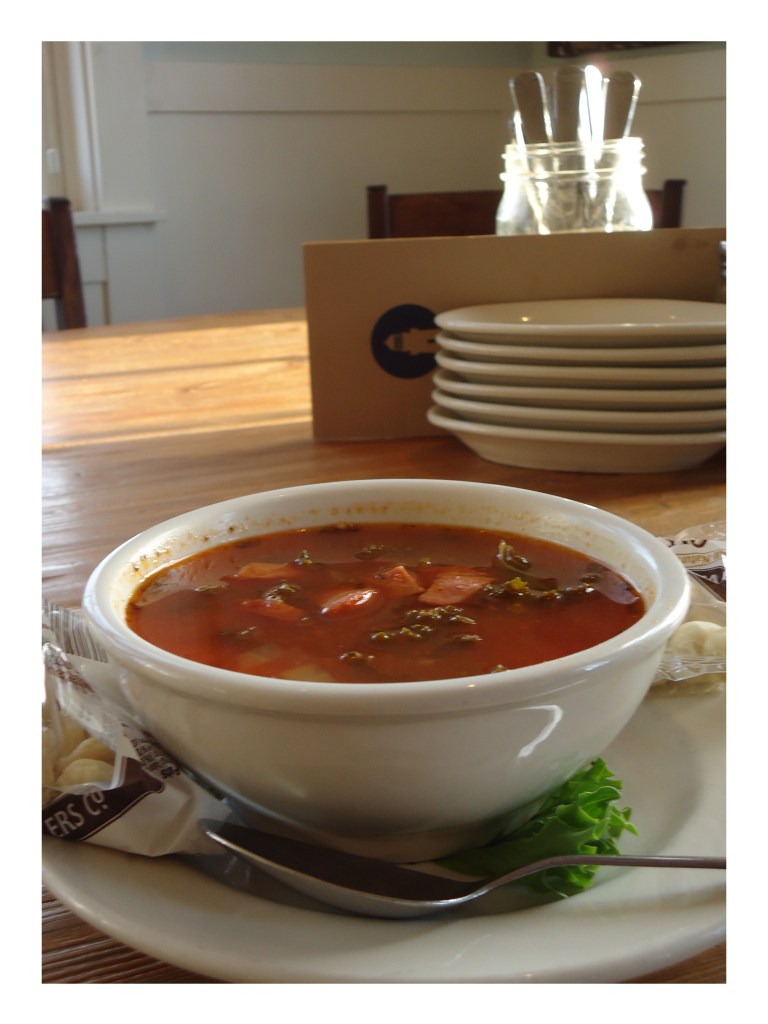When the snow flies, there’s nothing Drew Kinney likes better than a comforting bowl of steaming soup.
“I really like a good beef stew, or if I’m lucky enough to have some venison or lamb, or something like that – a nice hearty, classic, red meat stew,” said Kinney, one of the founders of Kamasouptra, the specialty soup restaurants in the Public Market House and the Maine Mall. “Big chunks of potatoes and veggies, the meat braised to the point that it’s falling apart, and kind of a gravy sauce, that really does it for me.”
Outside of a creamy casserole, soup is probably the ultimate comfort food, especially during winter. Hanging out in the kitchen, making a big pot of soup, is fun to do on a day when you’re stuck indoors because of a snowstorm or because the thermometer says it’s just too cold to venture outside.
Check the fridge for leftovers to use, and let the pot simmer for a good long while. The house will fill with irresistible smells, and the family will have something to warm their bellies all day long.
Making a tasty soup is good practice if you want to improve your skills in the kitchen.
“It’s a very basic form of cooking,” Kinney said, “and it allows you a lot of room to play around and experiment and and kind of see what works for you and what flavors you like as a cook.”
And, unlike calorie-rich casseroles, soup is one comfort food that won’t hurt your waistline.
James Hollis, an assistant professor of food science and human nutrition at Iowa State University, found in a recent study that people who eat soup are less likely to be overweight, probably because soup makes you feel full longer.
Hollis also found that Americans eat soup less often than people in other countries where the prevalence of obesity is much lower – including Japan, where half the population slurps some soup every day.
So if you’re interested in increasing your soup consumption, here are some tips to help you get through the next few cold months:
• Check your fridge for leftover onions, celery, carrots, chicken bones – or anything else that goes into a good soup or stock.
• Yes, make your own stock, if you can, for better flavor rather than using a store-bought brand or just water. The difference, Kinney says, is “like night and day.” If you roast a chicken for dinner one night, keep the bones, roast them and make a stock that you can keep in the freezer for six months. “That’s going to be by far superior to anything you’ll get in a grocery store. Some of those prepared stocks, they’re decent products but they’re still never going to be as good. They’re laced with sodium, they’re laced with preservatives. It’s just never going to be as pure as a homemade stock.”
• Taste as you go, so you don’t ruin an entire pot of soup with the wrong ingredient, or too much salt or other seasonings.
“Once you throw it in, you can’t get it out in soup,” said Alan Rosen, co-author of “Junior’s Home Cooking: Over 100 Recipes for Classic Comfort Food (Taunton Press, $24.95). “If you think that that tomato is going to be great in that butternut squash soup, you should probably not put it in. You should taste your soup first, and then add it.
“Same thing with seasonings in soups,” Rosen said. “You should test as you go. You can always add more salt, you can’t add less salt. You can always add more pepper, you can’t add less pepper. With seasonings you’ve always got to be careful because you could have worked three or four hours on a soup, but if you put in too much spice, it’s done.”
Rosen’s chain of comfort food restaurants in New York sell a number of soups, including classic French onion soup with Swiss cheese and a chicken soup with matzoh balls, which is the customer favorite. That leads to the next tip:
• It’s OK to take some short cuts, like buying pre-cut butternut squash for a roasted butternut squash soup, but know when to stop. Rosen’s French onion soup, for example, includes the classic bit of toast on top, and yes, it’s worth the trouble to toast it. Some people might just toss the bread on top of the soup, but then all you will have is soggy bread.
And don’t skimp on the cheese. It has major “comfort appeal.”
“You want that cheese over the top and running down the outside of your bowl,” Rosen said. “It’s fun to scrape up the side of the bowl while you’re eating it and pick at the cheese, if you know what I mean.”
• Don’t walk away from the pot for too long.
“It’s so easy to turn around and do something else and scorch everything that’s in the pan,” Kinney said. “With so much liquid being in the pot, it’s really easy to forget about it and to think that it’s all OK. But even though there’s a ton of water in there, things will still burn onto the bottom. Beans, as they cook they’ll sink, and they’ll scorch onto the bottom.”
• It’s hard to grow fresh herbs in the winter, especially in Maine, so don’t worry too much about using dried herbs in your soups.
“You just don’t need as much,” Kinney said. “You’ll need about three times as much fresh herb as you will dry herb. Yes, the flavor’s going to be a little different, it’s not going to be as robust. But in the grand scheme of things I think it’s OK if you use dry herbs.”
If you want to splurge on fresh herbs at the grocery store, do it where it will count the most. Kinney recommends always using fresh cilantro, parsley and basil because they taste best fresh.
Finally, just experiment. That involves more tasting. Taste the vegetables when they’re raw, and then again when they’ve been in the pot for a while.
“Every time that you change something, taste it and see what’s different,” Kinney said. “Just make a mental note, write it down, whatever it takes. And then you’ll be able to get a better picture of the whole process.
“The best advice I can give is just kind of play around with it,” he said. “Part of the learning process in cooking is you’re going to make mistakes. You’re going to make bad meals. But you’re also going to make good things. It’s experimenting and finding that balance that really leads you to be a good cook.”
Staff Writer Meredith Goad can be contacted at 791-6332 or at:mgoad@pressherald.com
Send questions/comments to the editors.







Success. Please wait for the page to reload. If the page does not reload within 5 seconds, please refresh the page.
Enter your email and password to access comments.
Hi, to comment on stories you must . This profile is in addition to your subscription and website login.
Already have a commenting profile? .
Invalid username/password.
Please check your email to confirm and complete your registration.
Only subscribers are eligible to post comments. Please subscribe or login first for digital access. Here’s why.
Use the form below to reset your password. When you've submitted your account email, we will send an email with a reset code.